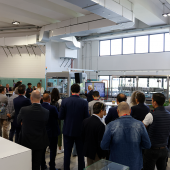Industrial software in the digital transition
Review on risks, responsibilities and new opportunities for industrial software companies with respect to the resources made available for the revival of the global economy with Next Generation EU and the National Recovery and Resilience Plan, passing through Transition 4.0.
Maurizio Cacciamani
The round table “PNRR, digitalization, sustainability. Ready, set, go!” was “a tasty appetizer” at the Forum Software Industriale, the event that ANIE Automazione Gruppo Software Industriale and Messe Frankfurt Italia have been organizing since 2019 and will return in 2022.
The industrial software sector is ready to restart and direct its efforts to achieve the ambitious goals set by Industry 4.0, combining innovation and sustainability, a central factor in the business strategy of the company.
As an introduction to the event, which took place at the MADE Competence Center Industria 4.0 in Milan, a preview of the new Industrial Software Group White Paper, written in collaboration with the Politecnico di Milano, was presented: “The Centrality of Man in the Era of Digital Transition”. The paper, presented by Raffaella Cagliano, Professor of People Management & Organization - Co-Director of the Industry 4.0 Transition Observatory, School of Management, Politecnico di Milano and Fabio Massimo Marchetti president of Gruppo Software Industriale, will be officially presented at the Group’s annual plenary meeting in December. It will focus on the need to combine technological innovation with a profound organizational innovation of the company, highlighting how the real value of Industry 4.0 lies precisely in the ability to increase the skills of people, enhancing the work of operators and eliminating activities with low added value.
And the centrality of man in the digital transformation was the leitmotif of the round table.
How to become protagonist
Digital is like a lever that can improve efficiency, generate new business models and enable a profound transformation that changes the relationship between customers, products and companies and opens up new forms of added value where people are at the center.
Silvia Olchini, Software and Digital Sales Manager Schneider Electric, pointed out how digitalization in production assets makes data available “to be fed” to software: these transform production and business processes to optimize, make efficient, create new models and services that can pour the benefits of technology on people; for example with new interfaces that use augmented reality, which make people more involved and protagonists and therefore, ultimately, productive.
Managing data
«Italian companies in the manufacturing sector have never had the opportunity to take advantage of such huge resources as they do now, and it is unlikely that a similar opportunity will arise again any time soon» began Mirko Magrini, MES Business Developer Wonderware Italia.
Magrini focused on how data should be managed (leaving the logic of the so-called small silos), adopting an overall vision with 10-year planning to be reviewed organically following the ERP logic.
Training and people growth
«Automation companies must offer solutions that can holistically and natively approach the convergence between the IT and OT worlds and that can allow future developments, now unknown, guaranteeing security and durability of the investment, but above all scalability and malleability».
Luca Conti, Area Sales Manager Beckhoff Automation, remarked how it is essential to create the basis of skills that can open up to future scenarios, facilitating the training and growth of people.
Immediate-use solutions
«As system integrators, we need to provide SMEs with solutions that are simple, immediately usable, sustainable and that guarantee certain and measurable results in a short time.
With Transition 4.0 SMEs have understood how to interconnect machines to their systems, bridging the gap between Operation Technology and ICT» said Guido Colombo, President & CEO Orchestra. «Now we think it’s time to provide them with digital self-learning solutions and collaborative systems, to grow the new levers and have humans at the center of the factory».
People are crucial
«When I meet customers, I don’t present products but I collect needs» began Riccardo Borsatti, Head of Digital Enterprise Application Center Siemens, who stressed that people are crucial in implementing digital transformation and innovation plans, even in the medium and long term. «Projects must have a quick return, but at the same time they must be linked together in a “holistic” and more complete vision. It is therefore essential to involve corporate figures, not only Operations, within a structured change management program».
Implementing skills
«The assessment of one’s own digital maturity is, for companies, the starting point of an evolution to be able to make the best use of the investment plans of the European NRPs and ESG funding. Once the map is done, it is necessary to prepare a plan for the implementation of skills», said Fabio Massimo Marchetti, Head of Digital Industries Var Group, who concluded by saying that, more than technologies, his company prefers to talk about concrete actions able to improve the way of producing by increasing efficiency, effectiveness and safety.
The Round Table ended with the intervention of Marco Calabrò, Ministry of Economic Development - General Directorate for Industrial Policy and Competitiveness, with a speech about the next Budget Law and the news related to the 4.0 measures.
System Integrators: who they are and what they do
As Morena Pietraccini, Expert Manager Engineering Ingegneria Informatica - Industries eXcellence explains, «Thanks to the experience gained in the design and production of industrial systems and processes, System Integrators (S.I.) are able to support companies in defining digital innovation projects, making the best use of technologies and methodologies. In the field of industrial automation, I.S. were among the first to face the digitalization processes, as they introduced innovative technologies long before the term Industry 4.0 was coined. Integration experts, who have been working inside factories for years, focus on the idea of creating and connecting the virtual world with the physical world of manufacturing, bringing their knowledge of contexts, global capabilities and skills to support the entire lifecycle of products and processes, from engineering to simulation, from production to use. They also analyze business opportunities, explore cutting-edge technologies, and deliver integrated solutions. They work with customers across all industries, supporting them in the process of transforming data into knowledge/intelligence, and then being able to make timely and forward-looking decisions».
But how to choose them? Based on their experience (hardware and/or software), their presence in the territory, the partners that support them, the services they offer (maintenance, training, etc.), and their ability to retrieve knowledge in various sectors are among the most important factors.



















